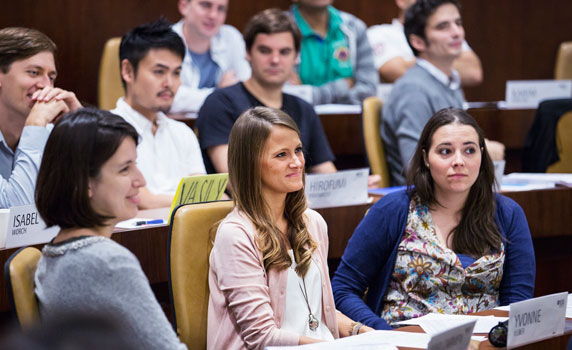
"Can constant drastic changes in strategies be compatible with sustained growth?"
This was the question put to an audience of more than 100 IESE MBA students at the IESE Entrepreneur’s Club last week by Josemaria Siota, research assistant with the IESE Entrepreneurship Department.
Siota, a former Deloitte consultant, has recently co-authored the book Revenue Growth: Four Proven Strategies, with Luiz Zorzella who joined the presentation by live video link.
His prime argument centered on the shift in strategizing from long to shorter-term. "The days where you had to closely follow a long-term strategy are long gone. Today’s shifting business environment means you have to adapt to rapid and ongoing change."
To research the book, the authors spoke with 780 entrepreneurs and executives in 77 leading companies with included WhatsApp, Google, PayPal and Groupalia. Many of these business leaders joined the session via Skype to debate the principal findings of the book.
Three Tips for Sustaining Growth Amid Shifting Strategies
Roberto Croci, sales manager in the south of Europe for Google Analytics, and Alejandro Navarro, Groupalia’s international development director, noted that most tech startups die around 20 months after the last funding round. The reason? Entrepreneurs don’t have the time or money to validate their business models.
The key learning here: maximize learning speed and minimize testing costs.
You Can’t Predict the Future
Patty Cox, a former Linkedin executive, joined Zorzella to discuss projections and what she described as the "impossibility of perfect foresight." No financial analyst ever predicted there would be 1.7 billion smartphones in circulation today, they said. Nor that smartphone usage would be growing at 20 percent. It’s not just down to analytical thinking, they concluded.
Key learning: Be creative in your thinking.
Why do Startups Fail?
The third and final issue in the session was explored by WhatsApp Business Development Executive Elies Campo and Raimundo Sala, head of sales in Spain and Portugal for PayPal. Empirically, they noted, three of every four start-ups fail. A solid 42 percent of those failures result from a gap between what entrepreneurs assume the market wants. And what it really wants.
The conclusion: Never assume you are right; always ask the customers.
The presentation was arranged by IESE’s Entrepreneur’s Club, which organizes a range of events where students can network with successful entrepreneurs and learn from their experiences.